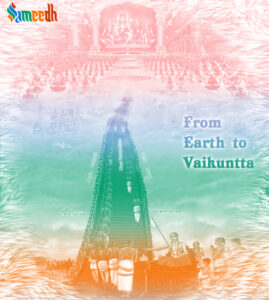The word “Vaikunth” is derived from Sanskrit and roughly translates to “the place devoid of anxiety” or “the realm of eternal bliss.” It is considered the abode of Lord Vishnu and the ultimate destination for souls seeking liberation (moksh) from the cycle of birth and death (samsar).

Vaikuntha is a divine realm in Hindu mythology and theology, often associated with Lord Vishnu, particularly in his form as Narayan. Vaikuntha is described as a realm of unparalleled beauty, tranquility, and opulence. It is believed to be a realm beyond the material universe, existing in a transcendental dimension beyond the reach of earthly limitations.
Vaikuntha is characterized by eternal happiness, peace, and bliss. It is free from suffering, sorrow, and the cycle of birth and death that characterize life in the material world.
Vaikuntha is inhabited by divine beings, including various forms of Vishnu’s attendants, celestial beings (devas), and liberated souls (muktas) who have attained spiritual enlightenment and union with the divine.
Vaikuntha is considered the principal abode of Lord Vishnu, where he resides with his consort, Lakshmi, and other divine companions such as Garud (the eagle mount) and Ananta Shesh (the serpent bed).
Vaikuntha is guarded by two gatekeepers known as Jaya and Vijaya, who are often depicted as fierce demigods (dvarapalakas) stationed at the entrance to ensure that only the righteous and deserving souls gain entry.
In Hindu devotional traditions, particularly within Sri Vaishnavism, devotees aspire to attain Vaikuntha as their ultimate spiritual goal. Through devotion (bhakti) to Lord Vishnu and adherence to righteous living, devotees seek liberation and the opportunity to reside eternally in Vaikuntha in the divine presence of the Lord.
Vaikuntha represents the pinnacle of spiritual attainment in Hinduism, embodying the state of absolute perfection, divine grace, and eternal union with the divine. It serves as a source of inspiration and aspiration for countless devotees on their spiritual journey towards ultimate liberation and divine communion.
